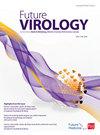HIV co-receptor tropism usage: first report from the Iranian patients
IF 1.4
4区 医学
Q3 VIROLOGY
引用次数: 0
Abstract
Aim: The HIV-V3 sequence influences tropism via the interaction of HIV with CCR5 and CXCR4 coreceptors; however, no consistent sequence accounts for R5 or X4-virus. Methods: RT-Nested PCR was performed to define V3-tropism in 123 samples using genotypic methods, including Geno2Pheno, WebPSSM, PhenoSeq, Net Charge and the 11/25 rule. Results: Among the samples studied, the HIV-1 R5 tropic viruses were predominant. However, X4 tropism could be a reason for the higher risk of treatment failure. A good accordance was observed between paired DNA/RNA tropism results. Conclusion: CCR5 inhibitors can be crucial in simplifying HIV treatment in Iranian patients. X4-virus is a risk factor for treatment failure. Proviral DNA (pvDNA) tropism result can be an appropriate target for V3-tropism determination.艾滋病毒共受体趋向性的使用:伊朗患者的首次报告
目的:HIV- v3序列通过与CCR5和CXCR4共受体的相互作用影响趋向性;然而,没有一致的序列解释R5或x4病毒。方法:采用gen2pheno、WebPSSM、PhenoSeq、Net Charge和11/25规则等基因分型方法,对123份样品进行rt -巢式PCR鉴定向v3性。结果:在所研究的样本中,HIV-1 R5热带病毒占主导地位。然而,X4趋向性可能是治疗失败风险较高的一个原因。配对的DNA/RNA趋向性结果具有良好的一致性。结论:CCR5抑制剂对于简化伊朗HIV患者的治疗至关重要。x4病毒是治疗失败的一个危险因素。前病毒DNA (pvDNA)的趋向性结果可作为测定病毒向v3趋向性的合适靶点。
本文章由计算机程序翻译,如有差异,请以英文原文为准。
求助全文
约1分钟内获得全文
求助全文
来源期刊

Future Virology
医学-病毒学
CiteScore
4.00
自引率
3.20%
发文量
84
审稿时长
6-12 weeks
期刊介绍:
Future Virology is a peer-reviewed journal that delivers essential information in concise, at-a-glance article formats. Key advances in the field are reported and analyzed by international experts, providing an authoritative but accessible forum for this ever-expanding area of research. It is an interdisciplinary forum for all scientists working in the field today.
 求助内容:
求助内容: 应助结果提醒方式:
应助结果提醒方式:


